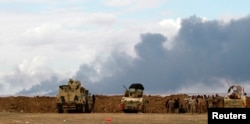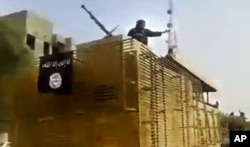Oil may not be the largest revenue source for Islamic State extremists, but it has been the most seductive.
For middlemen, civilians, rebels, and even the Syrian government, it has been hard to say no to cheap oil delivered to the doorstep, even if it is produced by the same brutal militants they are fighting.
The oil trade earns the Islamic State anywhere from $100 million and $500 million a year. That income, added to the money IS raises in "taxes," extortion and theft, "has given them the freedom to maneuver, more opportunities to attract people and fund their operations," said Howard Shatz, a senior economist with the Rand Corporation.
"The more money they have, the more attacks they can fund, and run something that actually looks like a state," Shatz said.
So why has the U.S.-led coalition failed to put a stop to the trade?
"It's not easy to get your hands around the problem," Ben Bahney, also with Rand, told VOA. "Overhead imagery is really hard to get. There are huge coverage gaps."
Moreover, Bahney said, after IS sells the oil to middlemen at the wellhead, hundreds of trucks carry the crude oil to foes and allies alike: to Bashar al-Assad's Syrian government forces, to Kurdish areas, to U.S.-supported rebels, to Turkey, to mobile refineries, and internally to fuel IS operations.
Matter of priorities
The U.S. and its coalition partners cannot control sales within Islamic State-held territory and to the Assad regime.
That leaves the job to the multiple groups that Washington is working with on the ground in Syria and Iraq. And stopping oil sales are not always at the top of their to-do list, particularly if they do not have any alternative energy sources.
"We are talking about a local coordination problem with local and regional partners who have their own set of priorities," Bahney said. "And it's conceivable that this may not rise to their level of being worth doing. And it would take some doing, and they would lose out. It might not be in their interest."
Turkey’s role
Russian President Vladimir Putin has charged that Ankara shot down one of its fighter jets "to protect oil supply routes" to Turkey, an accusation Turkish President Recep Tayyip Erdogan has hotly denied.
President Barack Obama on Tuesday also chastised the U.S. ally.
"I have had repeated conversations with President Erdogan about the need to close the border between Turkey and Syria,” he said. “We've seen some serious progress on that front, but there are still some gaps. In particular, there's about 98 kilometers that are still used as a transit point for foreign fighters, [and] ISIL shipping out fuel for sale that helps finance their terrorist activities."
That stretch of border is tough to control.
"There are a lot of corrupt officials,” said W. Andrew Terrill, a research professor at the U.S. Army War College in Carlisle, Pennsylvania. “And there is also a feeling that the Turks have had in the past — although it seems they might be getting over it — that they don't want to push too hard on ISIL because it's not particularly hard for someone from ISIL to start conducting a campaign of suicide bombings in southern Turkey."
Earlier in 2015, analysts said the Islamic State was not only producing but also refining crude oil from oil fields under its control, then selling the refined product to middlemen who were moving it throughout the region, including Turkey. So the coalition bombed IS refineries.
"There were some very optimistic estimates by the Treasury Department about how much it had affected [IS] revenue," Bahney said.
Early Treasury estimates that IS oil revenue had dropped to $2 million a week have been revised to $10 million a week.
‘Death of 1,000 cuts’
The United States, along with France and Russia, have recently started bombing the trucks lined up at IS wellheads.
But Michael Lynch, President of Strategic Energy and Economic Research, cautioned that historically it is hard to disrupt oil facilities. "You can reduce it; you can't actually eliminate the entire oil industry," he told VOA. "The biggest problem is that their oil holdings consist of a lot of small wells, and it is relatively easy for them to do low-tech repairs."







